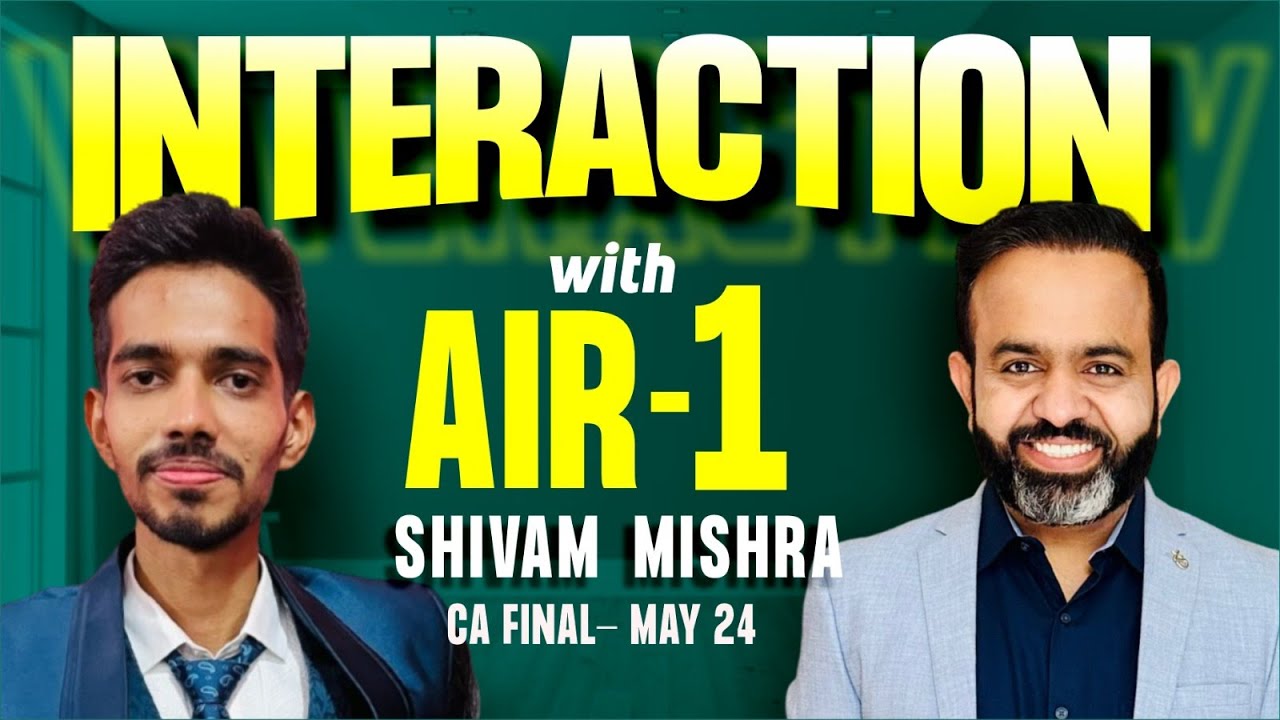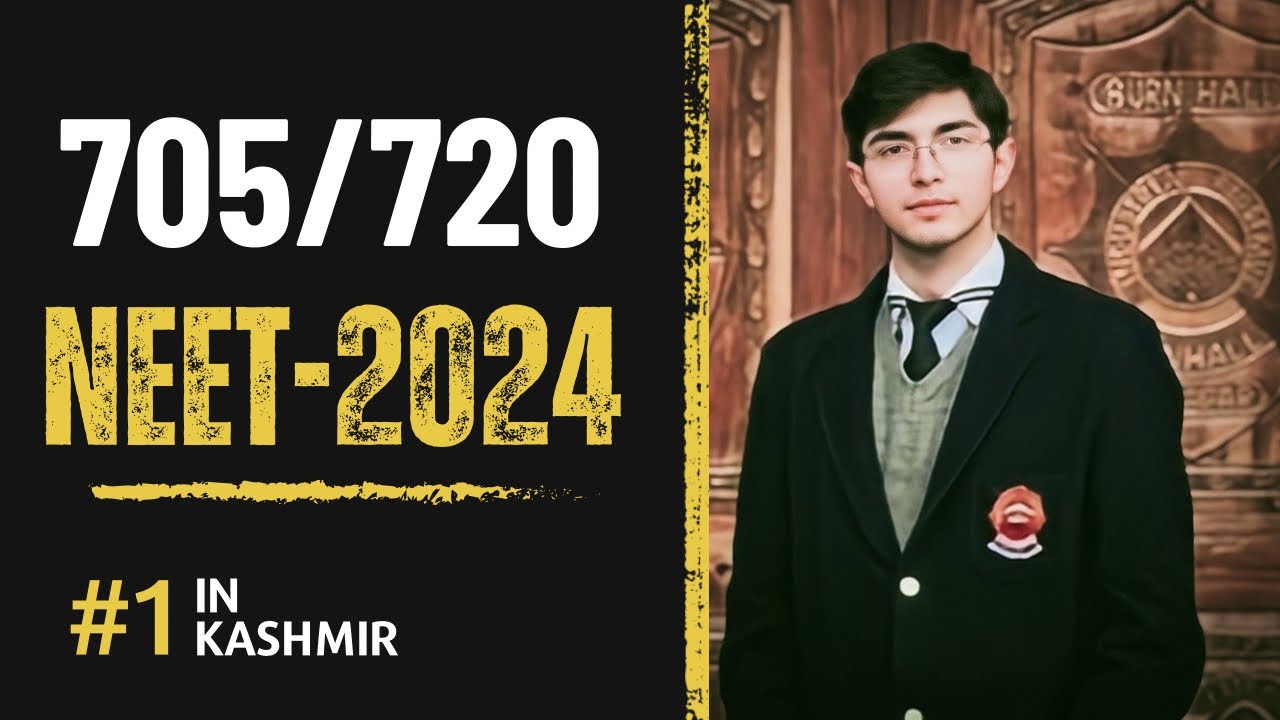How To Read Chemistry NCERT for NEET 2024? | Tanmay Gupta NEET 2021 AIR 1
Summary
TLDRTanmay Gupta, who secured All India Rank 1 in NEET 2021, shares his study techniques for the NCERT Chemistry textbook. He emphasizes different approaches for Physical, Inorganic, and Organic Chemistry. For Physical Chemistry, Gupta suggests understanding and numerical practice, focusing on basic concepts and NCERT exercises. Inorganic Chemistry requires thorough reading of NCERT without extra notes, while Organic Chemistry demands memorization of reactions and concepts directly from NCERT. Gupta also highlights the importance of NCERT questions for all sections, especially for Physical Chemistry, and recommends additional resources for practice in Physical Chemistry.
Takeaways
- 📚 The NCRT (NCERT) books for Chemistry are divided into three parts: Physical Chemistry, Inorganic Chemistry, and Organic Chemistry, each requiring a different approach to studying.
- 🧠 Physical Chemistry is understanding-based and numerical-based, so it's advised to read the NCRT, make notes, and then revise from those notes.
- 🔍 For certain chapters in Physical Chemistry, like 'Basic Concepts of Chemistry', it's crucial to read the NCRT thoroughly as numericals from these chapters are often asked.
- 📈 The chapters on 'Structure of Atom', 'Classification of Elements', and 'Chemical Bonding' are theory-based and require in-depth reading from the NCRT.
- 📒 It's suggested to maintain a small notebook for important theory points from the NCRT to avoid repeated readings of less important chapters.
- 📖 The questions at the end of the NCRT chapters in Chemistry are very important for concept building and often appear in examinations.
- 📘 Inorganic Chemistry requires knowing everything mentioned in the NCRT without the need for additional sources, and it benefits from multiple revisions.
- 🌿 Organic Chemistry is both concept and understanding-based, and it's essential to read and memorize every point from the NCRT, especially for named reactions.
- 📈 For 12th-grade Chemistry, the NCRT is again the primary source, with a focus on named reactions and theory, which should be read and revised multiple times.
- 📊 Practice from external sources like MTG books is recommended for Physical Chemistry, but for Inorganic and Organic Chemistry, thorough reading of the NCRT is sufficient.
Q & A
What is the significance of the NCERT books in preparing for the NEET exam according to Tanma Gupta?
-Tanma Gupta emphasizes the importance of NCERT books in NEET preparation, stating that they are crucial for understanding concepts and building a strong foundation for the exam.
How does Tanma Gupta suggest approaching the study of physical chemistry from the NCERT books?
-Tanma Gupta advises reading the NCERT books for physical chemistry with a focus on understanding and numerical problems, suggesting multiple readings and note-taking for better comprehension and practice.
What strategy does Tanma Gupta recommend for studying inorganic chemistry from the NCERT books?
-Tanma Gupta recommends reading the NCERT books for inorganic chemistry thoroughly without making separate notes, as every statement is important and might be needed for the exam.
How should one study organic chemistry using the NCERT books, according to Tanma Gupta?
-Tanma Gupta suggests reading the NCERT books for organic chemistry multiple times to understand and memorize important concepts and reactions, as the questions in the exam are often directly taken from the NCERT content.
Why does Tanma Gupta stress the importance of solving the exercises and questions at the end of NCERT chapters?
-Tanma Gupta highlights that the exercises and questions at the end of NCERT chapters are important for concept building, and they have been known to appear directly in the NEET examination.
What is Tanma Gupta's advice on note-making while studying from the NCERT books for chemistry?
-Tanma Gupta advises against extensive note-making for inorganic chemistry, preferring multiple readings from the NCERT books. For physical chemistry, she suggests making notes after one or two readings, and for organic chemistry, she recommends a separate notebook for important reactions.
How does Tanma Gupta differentiate between the study methods for the three parts of chemistry in the NCERT books?
-Tanma Gupta differentiates by suggesting that physical chemistry requires a mix of understanding and numerical practice, inorganic chemistry requires thorough reading and memorization, and organic chemistry needs both understanding and memorization with an emphasis on reactions.
What is the role of theory in studying chemistry from the NCERT books, as per Tanma Gupta's strategy?
-Tanma Gupta emphasizes that theory is crucial for all parts of chemistry, but especially for inorganic and organic chemistry, where every statement in the NCERT books is important and should be read and understood thoroughly.
How does Tanma Gupta view the changes in the NCERT curriculum and their impact on NEET preparation?
-Tanma Gupta acknowledges the changes in the NCERT curriculum and advises students to be aware of these updates, as they will affect the detailed study of certain chapters and their importance in the NEET exam.
What additional resources does Tanma Gupta suggest for physical chemistry preparation beyond the NCERT books?
-Tanma Gupta suggests using external resources like Singh's books and MTG books for additional practice in physical chemistry, but for inorganic and organic chemistry, she believes a thorough study of the NCERT books is sufficient.
Outlines

Cette section est réservée aux utilisateurs payants. Améliorez votre compte pour accéder à cette section.
Améliorer maintenantMindmap

Cette section est réservée aux utilisateurs payants. Améliorez votre compte pour accéder à cette section.
Améliorer maintenantKeywords

Cette section est réservée aux utilisateurs payants. Améliorez votre compte pour accéder à cette section.
Améliorer maintenantHighlights

Cette section est réservée aux utilisateurs payants. Améliorez votre compte pour accéder à cette section.
Améliorer maintenantTranscripts

Cette section est réservée aux utilisateurs payants. Améliorez votre compte pour accéder à cette section.
Améliorer maintenantVoir Plus de Vidéos Connexes

Interview with CA FINAL AIR - 1 Shivam Mishra l MAY 2024 l CA Bhanwar Borana

How to Read NCERT Biology for 360/360! TOPPER'S SECRET🤫 99% Don't Know this! ft. Bhavya & Dr Aman

Detailed Preparation Strategy with Mueed Nisar - 705/720 in NEET-2024

AIR 14 in CA Final May 25 – Here's Exactly What I Did

The *Extreme* NEET Timetable that Changed My Life - Do or Die | Anuj Pachhel

Rank 6 NEET PG'23 Dr Keshav (Marrow Pro) gave GTs early which helped him know his weak subjects
5.0 / 5 (0 votes)
